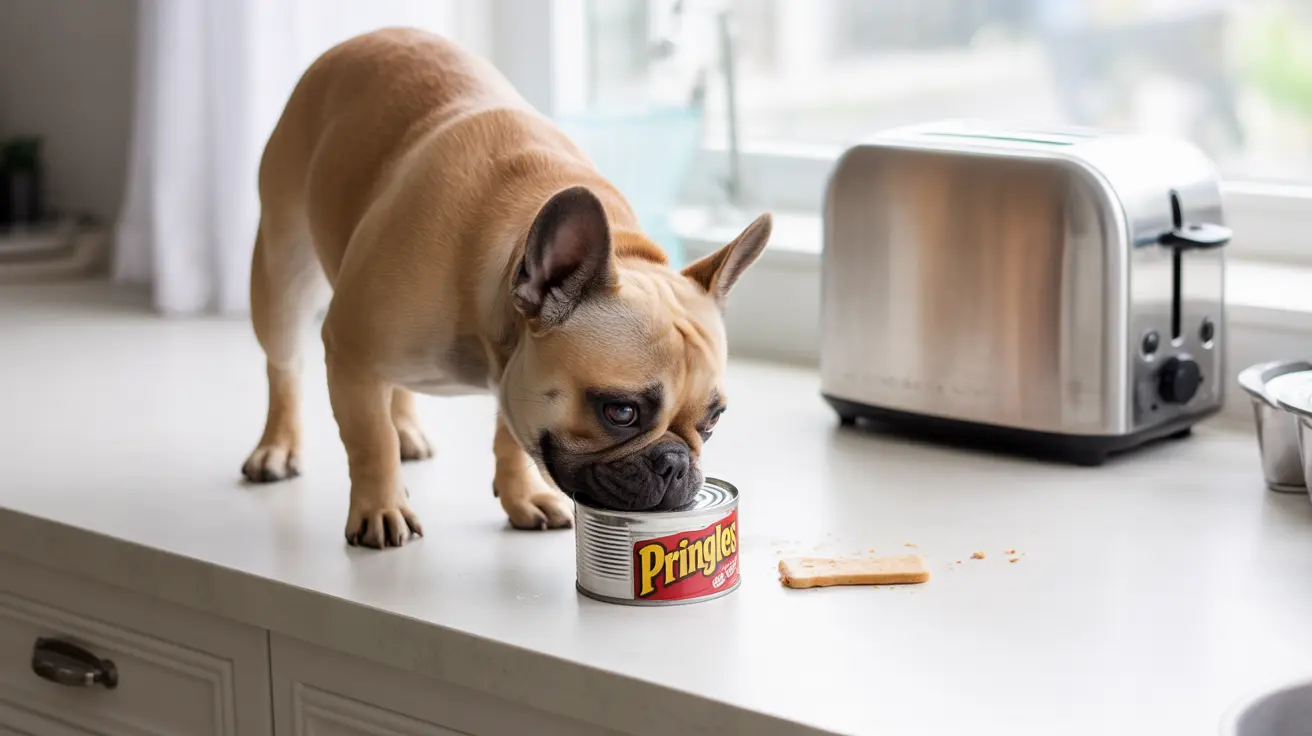Why Pringles Are Dangerous for Dogs
As a pet owner, you might be tempted to share your favorite snacks with your furry friend. However, when it comes to Pringles and other potato crisps, veterinary experts strongly advise against feeding them to dogs. These popular snacks contain ingredients that can be harmful or even toxic to our canine companions.
Understanding the risks associated with feeding Pringles to dogs is crucial for maintaining your pet's health and well-being. Let's explore why these seemingly innocent snacks can pose serious health risks to your dog.
The Hidden Dangers in Pringles
High Sodium Content
A single serving of Pringles (about 16 chips) contains approximately 150mg of sodium - nearly the entire daily requirement for a 24-pound dog. This excessive salt content can lead to:
- Severe dehydration
- Sodium ion poisoning
- Excessive thirst and urination
- Potential kidney damage
- In severe cases, seizures or death
Dangerous Fat Levels
With 9 grams of fat per serving, Pringles can trigger serious health issues in dogs, including:
- Acute pancreatitis
- Obesity
- Digestive upset
- Long-term cardiovascular problems
Toxic Ingredients in Flavored Varieties
Harmful Seasonings
Many flavored Pringles contain ingredients that are toxic to dogs:
- Onion powder
- Garlic powder
- Artificial flavor enhancers
- Chemical preservatives
High-Risk Flavors
Certain Pringles varieties pose additional risks:
- Sour Cream & Onion: Contains toxic allium compounds
- BBQ: Often includes onion and garlic powders
- Salt & Vinegar: Extremely acidic and high in sodium
- Cheddar: Contains dairy and artificial cheese powders
What to Do If Your Dog Eats Pringles
Immediate Actions
If your dog consumes Pringles, take these steps:
- Determine how many were eaten
- Check the flavor variety
- Monitor for immediate symptoms
- Contact your veterinarian if concerned
Warning Signs to Watch For
Look out for these symptoms:
- Excessive thirst
- Vomiting or diarrhea
- Lethargy
- Abdominal pain
- Unusual behavior
Healthy Alternatives to Pringles
Instead of Pringles, offer these dog-safe treats:
- Fresh carrot sticks
- Apple slices (without seeds)
- Plain, unsalted popcorn
- Commercial dog treats
- Small pieces of lean, cooked meat
Prevention Tips
Protect your dog from accidental Pringles consumption:
- Store snacks in secure containers
- Educate family members about the dangers
- Keep snacks out of your dog's reach
- Maintain a designated treat area
Frequently Asked Questions
Can dogs safely eat Pringles or similar potato crisps?
No, dogs should not eat Pringles or similar potato crisps. These snacks contain excessive salt, fat, and potentially toxic ingredients that can harm your dog's health.
What health risks can Pringles cause if my dog eats them?
Pringles can cause sodium poisoning, pancreatitis, obesity, and digestive issues. In severe cases, they may lead to kidney problems or even death if consumed in large quantities.
Are certain flavors of Pringles, like sour cream and onion, more dangerous for dogs?
Yes, flavored varieties are more dangerous because they often contain toxic ingredients like onion and garlic powder, which can cause severe illness in dogs.
What symptoms should I watch for if my dog has eaten Pringles?
Watch for excessive thirst, vomiting, diarrhea, lethargy, abdominal pain, and unusual behavior. In severe cases, seizures may occur.
What are healthier treat alternatives to Pringles for dogs?
Healthy alternatives include fresh carrots, apple slices (without seeds), plain popcorn, or commercial dog treats specifically formulated for canine nutrition.
Conclusion
While sharing snacks with your dog might seem harmless, Pringles and other potato crisps pose significant health risks to your pet. Instead, stick to dog-safe treats and consult your veterinarian about appropriate snack options for your furry friend. Remember, what's tasty for humans isn't always safe for dogs.






